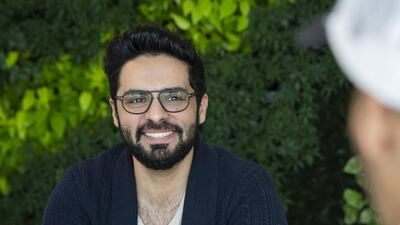ABU DHABI // All Ahmed Alanzi ever wanted was to become a fashion designer. But when it came time to choose a major in university, he dutifully elected to study sciences.
“Being a man, an Emirati man, it was quite unacceptable for someone like me to pursue a career or education in fashion design or design in general,” said the 30-year-old.
“It wasn’t that easy for me back then.”
But as the emirate’s arts and cultural scene began to blossom and attitudes evolved, more opportunities for young, aspiring artists and cultural entrepreneurs emerged.
For Mr Alanzi and 22 young Emirati creative professionals, the chance to pursue their passions and develop their artistic and cultural entrepreneurial talents came in the form of the Cultural Excellence Fellowship.
Offered by the Abu Dhabi Music and Arts Foundation and the British Council, the two-year programme was billed as the first of its kind.
It introduced students to arts and cultural experts who led training on topics such as business planning, audience development and marketing, community engagement and cultural sustainability.
The students were each paired with a mentor – cultural entrepreneurs or professional artists – who guided them throughout the two-year fellowship that began in 2014.
This month, the 23 students who completed the programme were honoured in a ceremony hosted by Sheikh Nahyan bin Mubarak, Minister of Culture and Knowledge Development.
“The fellowship has taught us the hands-on skills and valuable industry knowledge that we need to further grow and develop into cultural leaders,” said Waheeda Al Hadhrami, 23.
She said it had fostered a group of “young, ambitious Emiratis who are passionate, dedicated and skilled to contribute to making the industry grow further”.
Hoda Al Khamis-Kanoo, founder of Abu Dhabi Music and Arts Foundation (Admaf), said the UAE’s creative and cultural sector had flourished over the past 12 years.
It had become an “important element of the nation’s economy” and “a symbol of its dynamic spirit”.
“In order for it to continue, it needs skilled and knowledgeable people to drive growth,” said Ms Al Khamis-Kanoo.
She said Admaf invested in UAE youths’ artistic ability as well as the entrepreneurial talent of cultural professionals.
The fellowship provided a training ground “to bring together the best of the emerging Emirati talent with established cultural leaders from the UAE, UK and elsewhere to prepare the rapidly evolving UAE cultural and creative sector for the road ahead”, said Ms Al Khamis-Kanoo.
The fellowship has had a significant effect on Mr Alanzi.
“I don’t feel like a spectator any more. I’m involved with the creative community,” he said. “I feel a bit more confident and I’m no longer frustrated. It’s nice to feel that it’s never too late, you’re never too old to follow your dreams.”
Should the fellowship be offered again, Mr Alanzi said he would like to serve as a mentor.
“I just hope that one day I can give back to the community and help to empower Emirati youth to consider the creative industry,” he said.
“Because what we need now are people who are passionate about their jobs.”
rpennington@thenational.ae

